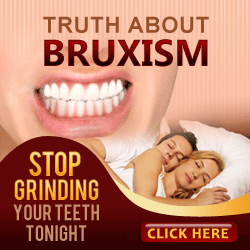Review on Cure for bruxism
 | |
| Bruxism Cure | Bruxism Solution |
The site, www.cureforbruxism.com was formed by
Charles Harrison as a measure for guiding people suffering from bruxism
to overcome the illness. The greatest risk involved with bruxism is that
many of the bruxers are unaware of this habit in them until irrevocable
damage has been inflicted to their teeth and gums.
Charles Harrison, a bruxer himself, came up with
innovative methods for treating bruxism where other treatments were
found to be ineffective. The success of his treatment procedure
motivated him to launch the site where the people can download the
programs for a cost-effective rate.
The story behind cure for bruxism
The personal sufferings of Charles Harrison caused
by bruxism resulted in the formation of cure for bruxism. By the age of
nine, his teeth got flattened after incessant grinding done during the
night. Resorting to neither the $500 night guard nor a sports mouth
guard could spare his teeth from further damage. This made him probe
deep into the cause of the night chewing. While some suggested stress to
be the cause of the same, another dentist concluded malocclusion to be
the explanation. But when they were proven to be wrong, Harrison decided
to identify those factors that would help him to fight the disease.
Visiting a dentist, an acupuncturist, neither a
hypnotherapist nor a craniologist helped him in his struggle against
bruxism. His long-term efforts in identifying and analyzing the factors
responsible finally saw a positive outcome over the period. A few
changes to the lifestyle and some exercises proved effective in his
quest for solution. This resulted in the formation of the site
www.cureforbruxism.com where he provides a detailed step-by-step
procedure for getting over the illness.
Unlike other treatments, cure for bruxism makes use
of natural methods for retraining the mouth muscles which would
ultimately stop teeth grinding in the night. He aims to identify the
real cause for bruxism, the relationship between sleep posture and
grinding of teeth, effectiveness of herbal remedies in bruxism, the
“press clench” exercise, and other exercises and techniques that can
guarantee a stop to this alarming habit.
A one-time payment of $37 can take you through
‘Save your smile, Stop grinding” which is a downloadable program with
lots of illustrations explaining the procedure to be followed in detail.
Joining now makes one entitled to get unlimited access to the members’
area, two bonus books – one on facts for stress related grinders and
long-term teeth grinders, and the other on dream analysis – besides
having free future updates.
 |
| bruxism solution |

